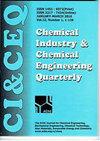Internal model control of cumene process using analytical rules and evolutionary computation
IF 0.8
4区 工程技术
Q4 CHEMISTRY, APPLIED
Chemical Industry & Chemical Engineering Quarterly
Pub Date : 2023-01-01
DOI:10.2298/ciceq220711014m
引用次数: 0
Abstract
Cumene is used as precursor for production of many organic chemicals and as thinner in paints & lacquers. Its production process involves one of the large-scale manufacturing processes with complex kinetics. Different classical control strategies have been implemented and compared for the cumene reactor in this process. As a system with large degrees of freedom a novel approach for extracting the state space model from the COMSOL Multiphysics implementation of the system is adopted here. Internal Modern Control (IMC) based PI and PID controllers are derived for the system. To derive the controller setting the system is reduced to the FOPDT and SOPDT model structure using Skogestad half rules. The integral time is modified to obtain the excellent set point tracking and faster disturbance rejection. From the analysis it can be stated that PI controller suits more for this specific process. Particle Swarm Optimization (PSO) algorithm, an evolutionary computation technique is also used to tune the PI settings. The PI controllers with IMC, Zeigler Nichols and PSO tuning are compared and it can be concluded that PSO PI controller settles at 45s without any oscillations and settles down faster for the disturbance of magnitude 0.5 applied at t=800s, through it is computationally intensive compared to other controller strategies.基于解析规则和进化计算的异丙烯过程内模控制
异丙苯被用作生产许多有机化学品的前体,也被用作油漆和漆的稀释剂。其生产过程涉及复杂动力学的大规模制造过程之一。在此过程中对异丙烯反应器采用了不同的经典控制策略并进行了比较。作为一个大自由度系统,本文采用了一种新的方法从系统的COMSOL Multiphysics实现中提取状态空间模型。提出了基于PI和PID控制器的内部现代控制(IMC)。利用Skogestad半规则将系统简化为FOPDT和SOPDT模型结构,推导出控制器的整定值。对积分时间进行了修正,获得了良好的设定值跟踪和更快的抗干扰能力。从分析可以看出,PI控制器更适合这一特定过程。粒子群优化(PSO)算法,一种进化计算技术,也用于调整PI设置。比较了具有IMC、Zeigler Nichols和PSO整定的PI控制器,可以得出结论,PSO PI控制器在45秒稳定,没有任何振荡,并且在t=800s施加0.5量级的扰动时稳定得更快,因为与其他控制器策略相比,它的计算量很大。
本文章由计算机程序翻译,如有差异,请以英文原文为准。
求助全文
约1分钟内获得全文
求助全文
来源期刊

Chemical Industry & Chemical Engineering Quarterly
CHEMISTRY, APPLIED-ENGINEERING, CHEMICAL
CiteScore
2.10
自引率
0.00%
发文量
24
审稿时长
3.3 months
期刊介绍:
The Journal invites contributions to the following two main areas:
• Applied Chemistry dealing with the application of basic chemical sciences to industry
• Chemical Engineering dealing with the chemical and biochemical conversion of raw materials into different products as well as the design and operation of plants and equipment.
The Journal welcomes contributions focused on:
Chemical and Biochemical Engineering [...]
Process Systems Engineering[...]
Environmental Chemical and Process Engineering[...]
Materials Synthesis and Processing[...]
Food and Bioproducts Processing[...]
Process Technology[...]
 求助内容:
求助内容: 应助结果提醒方式:
应助结果提醒方式:


